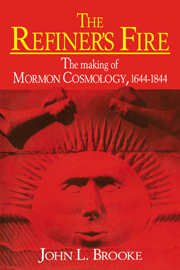Book contents
- Frontmatter
- Contents
- List of Illustrations
- List of Maps
- Preface
- Part I A Prepared People
- Part II Hermetic Purity and Hermetic Danger
- Part III The Mormon Dispensation
- 7 Secret Combinations and Slippery Treasures in the Land of Zarahemla
- 8 The Mysteries Defined
- 9 Temples, Wives, Bogus-Making, and War
- 10 The Keys to the Kingdom
- 11 A Tangle of Strings and the Kingdom of God
- 12 Let Mysteries Alone
- Appendix The Sectarian and Hermetic Circumstances of Mormon Origins in Vermont and New York
- Abbreviations Used in Notes
- Notes
- Index
9 - Temples, Wives, Bogus-Making, and War
Published online by Cambridge University Press: 30 October 2009
- Frontmatter
- Contents
- List of Illustrations
- List of Maps
- Preface
- Part I A Prepared People
- Part II Hermetic Purity and Hermetic Danger
- Part III The Mormon Dispensation
- 7 Secret Combinations and Slippery Treasures in the Land of Zarahemla
- 8 The Mysteries Defined
- 9 Temples, Wives, Bogus-Making, and War
- 10 The Keys to the Kingdom
- 11 A Tangle of Strings and the Kingdom of God
- 12 Let Mysteries Alone
- Appendix The Sectarian and Hermetic Circumstances of Mormon Origins in Vermont and New York
- Abbreviations Used in Notes
- Notes
- Index
Summary
Elijah the prophet, who was taken to heaven without tasting death, stood before us and said: Behold, the time has fully come, which was spoken of by the mouth of Malachi – testifying that he [Elijah] should be sent, before the great and dreadful day of the Lord come – To turn the hearts of the fathers to the children, and the children to the fathers, lest the whole earth be smitten with a curse – Therefore, the keys of this dispensation are committed into your hands; and by this ye may know that the great and dreadful day of the Lord is near, even at the doors.
Joseph Smith's and Oliver Cowdery's vision of Elijah in the Kirtland temple, April 3, 1836The history of the latter-day saints between the summer of 1833 and the fall of 1839 is one of hubris and affliction. Mobs and militias in Ohio and Missouri threatened the church, but so did the strenuous but erratic efforts made by the prophet to institutionalize his authority and his new theology, and so did the response that those efforts engendered among some of his earliest followers. In sum, without a drastically different political framework, the cosmology and polity of the Mormon experiment were simply too absolutist to survive challenges from within or without. It would not be until internal dissent was silenced and external hostility was held at a distance, first at Nauvoo and then in the Great Basin, that Mormon theology and society could be established on its prophet's own terms.
- Type
- Chapter
- Information
- The Refiner's FireThe Making of Mormon Cosmology, 1644–1844, pp. 209 - 234Publisher: Cambridge University PressPrint publication year: 1994



